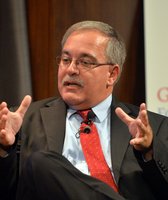Stand up for the facts!
Our only agenda is to publish the truth so you can be an informed participant in democracy.
We need your help.
I would like to contribute
Perdue pay raise claim falls short
Veteran U.S. Rep. Jack Kingston of Savannah and millionaire businessman David Perdue are stepping up their attacks as decision day rapidly approaches in the GOP primary runoff for the U.S. Senate.
Kingston and Perdue are locked in what’s arguably the most contentious and closely watched Georgia contest on the July 22 primary runoff ballot. Charges and countercharges are flying.
One of the charges being leveled by Perdue, the front-runner in the May primary, is that Kingston has wasted tax dollars on earmarks "all while voting to raise his own pay seven times."
PolitiFact has already examined the claim about Kingston’s record on earmarks. Now, we’ll delve into the second part of the claim that’s currently airing on television and radio and answer the question: Did Kingston, a member of Congress since 1993, vote to raise his own congressional pay seven times?
With public opinion of Congress in the tank, House and Senate members have been loath to raise their own pay. That’s likely why congressional raises are a campaign issue, not just this year and not just in Kingston’s race. That also may explain why fact-checking the claim is more complicated than simply pulling legislation and checking individual House and Senate members’ votes.
First, a little history.
Article I, Section 6, of the Constitution requires members of Congress to set their own pay. From 1789 to 1968, members of Congress passed specific bills that raised their pay 22 times, according to a June 2014 report by the Congressional Research Service.
Members of Congress were initially paid a daily rate -- $6 a day in 1789 -- and drew their first annual salary -- $1,500 -- in 1815. Forty years later, they were drawing $3,000 a year.
But since passage of the Ethics Reform Act of 1989, members of the House and Senate have been eligible for annual raises without having to be on-record voting for them.
The raises are calculated by a formula that involves changes in private-sector wages and salaries. They are automatic each Jan. 1 unless Congress votes to reject the adjustment or votes to change the amount.
According to the Congressional Research Service, lawmakers have let their pay be increased automatically 13 times.
They’ve also voted to decline or delay their raises during 11 years, including in 2010, 2011, 2012, 2013 and 2014. Kingston voted with the majority eight times. That is, Kingston voted to limit his pay, not increase it.
In January 2009, congressional salaries went from $169,300 to their current $174,000. (And unless they vote again to decline a raise, lawmakers’ pay is set to increase 1.6 percent, or $2,800, in January, according to recent estimates.)
So how can Perdue say that Kingston voted to raise his own pay seven times when automatic pay raises were established in 1989 and Kingston’s only been in Congress since Jan. 3, 1993?
Here’s the simple answer: Perdue’s not counting Kingston’s votes in favor of raising congressional salaries. Instead, Perdue’s counting procedural votes Kingston cast. Those votes blocked efforts to nix the automatic pay raises.
PolitiFact checked a similar claim in 2011 when U.S. Rep. Connie Mack IV came under attack by Republican rival George LeMieux in Florida’s U.S. Senate race. That was rated a Half True.
Perdue’s claim, like LeMieux’s, is based largely on procedural votes. The votes by Kingston took place in 1999, 2001, 2002, 2003, 2004, 2006 and 2007, Perdue spokesman Derrick Dickey said.
We'll try to explain a complicated process as simply as we can.
A member of Congress -- for years it was U.S. Rep. Jim Matheson, D-Utah -- pushes for an up-or-down vote on continuing the automatic pay raises. In most years, a procedural vote is used to effectively block that effort.
Alyson Heyrend, Matheson's then-spokeswoman, explained the procedural move to PolitiFact in 2011.
"Matheson each year sought a 'no' vote on a procedural vote on Ordering the Previous Question," she told Politifact in an email. "Had a majority voted 'no' he would have then offered the amendment to deny the annual congressional pay raise."
Matheson was concerned "that the public isn't able to see Congress take an open, up-or-down vote on whether or not to raise their salaries," Heyrend said.
Pete Sepp, executive vice president of the National Taxpayers Union and Foundation, said it’s important to understand that any efforts on the pay raises are always tied to larger bills dealing with appropriations. "People of varying ideologies and causes would have numerous reasons for supporting or opposing the bill," Sepp said, meaning that votes for or against a bill could have something or nothing to do with the pay raise.
In 1999, for instance, Rep. Ernie Fletcher, R, Ky., argued that lawmakers shouldn’t take a $3,800 raise, boosting their pay to $145,000 a year, saying: "I have a hard time voting to increase my pay when people in my district are earning an average income of $25,000 a year."
According to press reports from the time, Fletcher’s move was defeated on a procedural vote, 250-173. House journals show Kingston voting with the majority. The journals also show Kingston voting "Yes" with the majority on similar procedural votes in 2001, 2002, 2003, 2004, 2006 and 2007. Those votes blocked efforts by Matheson, Fletcher and others to put forth an amendment to stop the pay raise.
And even if they had not been blocked, a majority would have still had to go along with their amendment, several congressional experts told us.
So, did Kingston vote seven times to give himself a raise? No. He didn’t have to because the raises are automatic unless Congress votes to turn them down as they have for five years.
Did he vote to stop a push for an up-or-down vote on accepting or rejecting the raises? Yes. He did that seven times. But he also voted with the majority to deny or delay the raises eight times.
Greg Dolan, Kingston’s congressional spokesman, said: "Representative Kingston was not ‘voting to increase his pay’ any more than he was voting against renaming the moon."
"Just because a potential amendment may have been introduced, voting to get on with the work of the House is not equivalent to voting against any and all other extraneous issues," he said.
Dickey, Perdue’s spokesman, said the pay raises were inappropriate and Kingston knew that as far back as 1992 when he told a Savannah paper that congressional raises should be tied to passage of a balanced budget
Our ruling
Congress has created a system that allows its members to receive annual raises without having to vote on them.
Perdue is off base to say Kingston voted to raise his pay seven times. Kingston cast procedural votes -- with the majority -- that effectively allowed Congress’ automatic pay raises to stand in some years. Kingston did not cast direct votes to raise his pay as Perdue’s ads imply.
When there was a direct vote to decline pay increases, Kingston voted with the majority to do just that eight times.
There’s a bit of truth to Perdue’s claim. But there’s even more context missing.
We rate Perdue’s claim Mostly False.
Our Sources
Congressional Research Service Report, July 17, 2014, P. 16 ref. votes denying or delaying pay adjustments, Emails with Derrick Dickey, campaign spokesman for David Perdue
Emails with Chris Crawford, campaign spokesman for Jack Kingston
Emails and phone calls with Greg Dolan, spokesman for Kingston’s congressional office
Procedural votes cited in Perdue ad accusing Kingston of voting for salary increases for himself seven times. Votes in 1999, 2001, 2002, 2003, 2004, 2006 and 2007
Emails and phone calls with Pete Sepp, executive vice president, National Taxpayers Union
U.S. Library of Congress, Roll Call votes on H.R. 920; H.R. 4539; H.R. 2020; H.R. 3610; H.R. 4328; H.J. Res. 102; H.J. Res, 20; H.R. 1105; H.R. 5146; H.R. 3082; H.R. 3082; H.J. Res. 117; H.R. 8; H.R. 2775, in which House voted to deny or delay pay adjustments
The Associated Press, "House agrees to $3,100 raise for 2006"
Browse the Truth-O-Meter
More by Nancy Badertscher
Perdue pay raise claim falls short
Support independent fact-checking.
Become a member!
In a world of wild talk and fake news, help us stand up for the facts.


























































